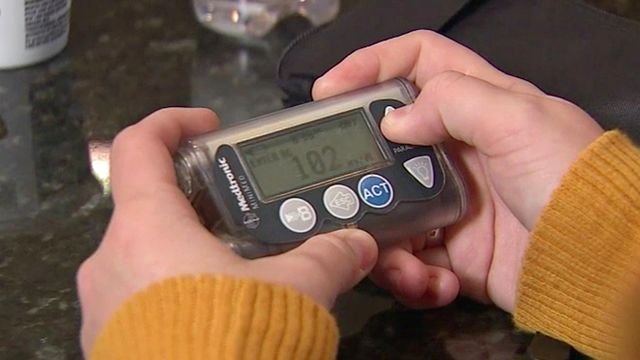Bionic pancreas could be 'game-changer' for diabetics
UNC Hospitals is part of a trial study for the development of a bionic pancreas, which promises to help those suffering from Type 1 diabetes.
Posted — UpdatedFor most Type 1 diabetics, daily life means counting carbs, pricking a finger, and dosing and injecting insulin.
“I had to plan my meals according to certain times of day,” said Jamie Diner, who has the chronic disease. “I was told to eat the same amount of carbs at breakfast, lunch and dinner.”
Diner, 26, doesn't manage her Type 1 diabetes the way she did as a child because now she has an insulin pump.
Dr. John Buse, chief of UNC Hospitals endocrinology unit, says the pump sends insulin into the body to keep blood sugar levels from getting too high.
“The insulin pump allows for a very precise delivery of insulin,” he said.
Diner is his clinical research nurse, and she’s coordinating a study on a bionic pancreas. In addition to the pump, she wears an FDA-approved continuous glucose monitor or CGM. It continuously reads the blood sugar level and wirelessly transmits the information to her pump.
“The monitor is here in my leg,” she said.
She can check the level anytime.
In the upcoming bionic pancreas study, the CGM transmits information to an iPhone app, which does the math to dispense a precise dose of insulin from one pump or glucagon from a second pump to raise blood sugar when the levels are too low.
“Only about 10 percent of patients achieve that level of control on their own, so this would be a total game-changer for 1 to 2 million people with Type 1 diabetes,” Buse said.
The trial at UNC Hospitals, which begins this month, is in conjunction with Massachusetts General Hospital and Boston University.
“There's a large unmet need, I think, with Type 1 diabetes,” Diner said. “And I think this will really help it out.”
• Credits
Copyright 2024 by Capitol Broadcasting Company. All rights reserved. This material may not be published, broadcast, rewritten or redistributed.





